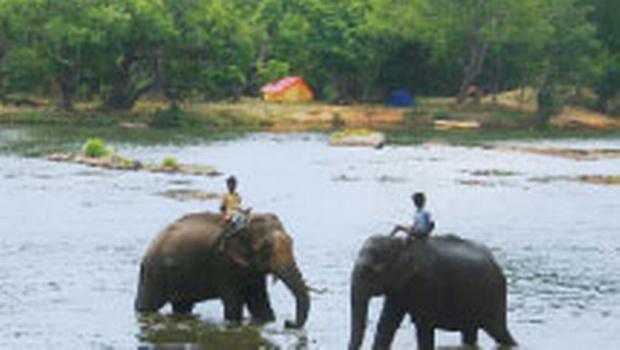Kodaimelanadu or Kodagu or Coorg is an hour-long drive from Mysore along winding roads that take you through a collage of colours which explode into shades of greens, browns and yellows. As you squint through the green fabric, plantations of coffee, cardamom and pepper speed by, merging with larger forestscape. The hiss of the tyres accentuate the haunting solitude of the journey; no wonder Coorg is called the Scotland of the East.
Much of Coorg is about coffee and a fair amount of cardamom and pepper. Siddapur district seemed a tree-shadowed coffee estate, dotted with contradictions—a few market places, seedy bars, pork shops and elegant vegetable displays. As we travelled, we grew wiser about coffee: its history, its clandestine entry into India, and the difference between arabica and robusta. The British brought coffee to Coorg. The first estate was established way back in 1850s by an Englishman, John Frawler.
Coorg seems to be made for introverts, there is an overwhelming feeling of seclusion, where from a distance you can spot a coffee pod, but it is difficult to spot your immediate neighbour. It is an immense aviary, and home to nearly a quarter of the bird population of Karnataka. The tour guide seemed to be Coorgi Salim Ali; he knew the names of each and every bird. At times he even imitated their calls perfectly. Every hilly region has at least one well known waterfall, and in Coorg it is Abbey Falls that plunges down, separating some coffee and spice estates to join the river Kaveri. An army of clouds envelope the hill. The walk is enough to give anyone an appettite for the singular flavours of Kodava food. The central piece of Kodava cuisine is meat and rice. I tried the irresistible Pandi curry, a subtle pork dish, cooked well by adding a local fruit, Kanchampali. Dry spices are roasted before grounding them, giving a toasty flavour to the thick curry.
As night falls, the highlands of Kodagu become a magical place. The moon shines brightly and the trees are laden with millions of fireflies, as if decked up for some fat Indian wedding.
In the morning, the mist-laden verdant hills awaited in silence. The Dubare reserve encompasses 50,000 acres and is home to the elephants of the Western Ghats. Majestic rosewood, teak and other hardwood tree species stand around like sentinels. Giant parasitic vines are swathed around large banyans and other trees in a macabre bond. As Hansel and Gretel would’ve felt, the forest kept getting thicker and more enchanting. Below, the river Kaveri, flowed unmindful of the inter-state disputes. Grabbing a coracle, drifting on the green waters and gauging the moods of the river and the pristine surroundings is one way to experience Coorg.
Local myth says the invincible Coorgis descended from Alexander’s Macedonians. “Neither Tipu Sulatan, nor the British could conquer it,” said the guide. The place has a long history of war; the Madikeri fort is a living testimony to that. Built as a mud fort by Mudduraja in the 17th century, it was later rebuilt in granite by Tipu Sultan who renamed the site Jaffarabad. In the north-east corner at the entrance stand two life-size statues of elephants. A church stands in the south-east corner. The fort also houses a prison.
Among the other architectural treasures of Coorg is the Omkareshwara temple built by King Lingaraja in 1820, in a mosque-like style, with an impressive central dome and four minarets, which are surrounded by Basavas, or sacred bulls. On the top of the dome sits a gilded ball with a weathercock. The Raja’s seat is a small pavilion in a garden, offering a view of the green valley below, where it is said the kings of Coorg spent evenings with their consorts. From there, they would’ve seen the melting sun, parrot-green fields and the mountains sleeping in the mist as if time had dawdled here, mesmerised by the languid beauty of Kodagu.
To Reach: Madikeri is the nearest bus station. There are frequent buses from Mysore, Mangalore and Bangalore to Coorg.
To Stay: For luxury, the Orange Country Inn. For an authentic Coorg experience, try a planation home stay.
source: http://www.newindianexpress.com / The New Indian Express / Home> LifeStyle> Travel / by Aakash Mehrotra / May 29th, 2014


